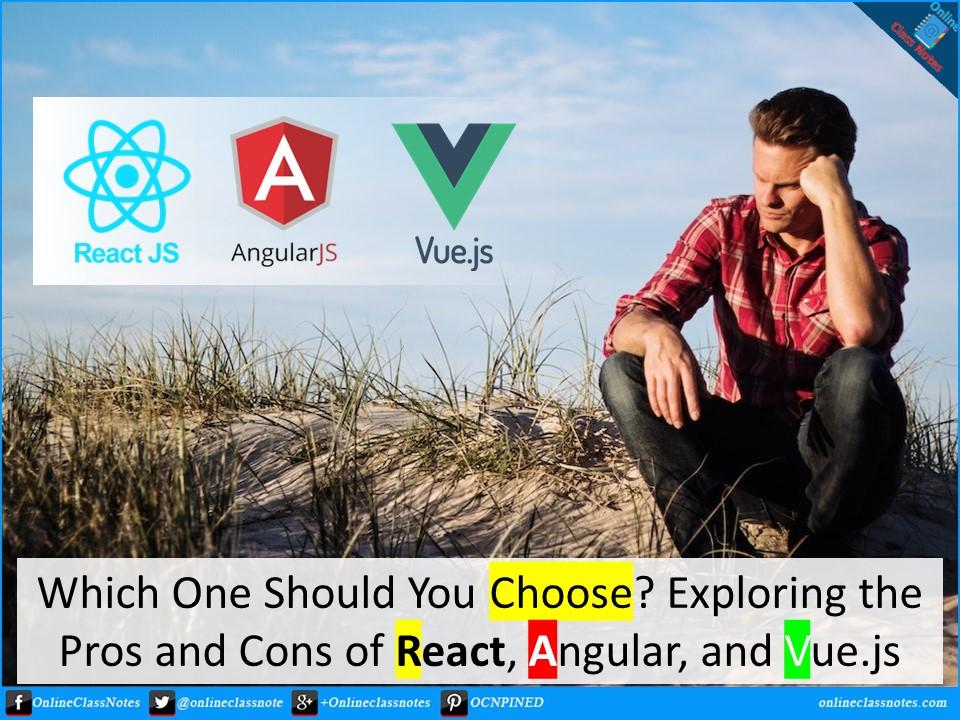Web Development Frameworks: Which One Should You Choose? Exploring the Pros and Cons of React, Angular, and Vue.js
In the ever-evolving world of web development, choosing the right framework can significantly impact your productivity, project scalability, and overall development experience. With an array of options available, it’s crucial to understand the pros and cons of each framework before making a decision. In this post, we will delve into three popular web development frameworks: React, Angular, and Vue.js. Let’s explore their strengths and weaknesses to help you make an informed choice.
React:
React, developed by Facebook, has gained immense popularity for its component-based architecture and virtual DOM (Document Object Model) rendering. Here are the key advantages and considerations of using React:
Pros:
- Lightweight and fast: React’s virtual DOM efficiently updates only the necessary components, resulting in better performance.
- Component reusability: The modular nature of React allows developers to reuse components, enhancing code maintainability and reducing redundancy.
- Strong community support: React has a vast community and an extensive ecosystem of libraries, tools, and resources.
- Easy learning curve: React’s declarative syntax and component-based approach make it relatively easy to learn for JavaScript developers.
Cons:
- Steep initial setup: Setting up a React project can be more involved, especially for beginners, due to the need for additional configuration and tooling.
- Lack of built-in features: React focuses primarily on the view layer, so developers need to integrate additional libraries for state management, routing, and form handling.
- Frequent updates: React introduces new features and APIs regularly, which may require developers to stay up-to-date with the latest changes.
Learn More at React
Angular:
Angular, a robust framework maintained by Google, offers a complete solution for building large-scale applications. Let’s explore the advantages and considerations of choosing Angular:
Pros:
- Full-featured framework: Angular provides a comprehensive set of tools, including dependency injection, routing, form validation, and state management.
- TypeScript support: Angular is built with TypeScript, a statically-typed superset of JavaScript, which enhances code maintainability, type checking, and IDE support.
- Powerful CLI: Angular’s Command Line Interface (CLI) simplifies project setup, scaffolding, and automates common development tasks.
- Strict architectural guidelines: Angular enforces a structured and opinionated architecture, promoting maintainability and scalability for large projects.
Cons:
- Steeper learning curve: Angular’s extensive features and complex concepts can make it more challenging to learn, especially for developers new to web development.
- Verbosity: Angular’s syntax can be verbose compared to other frameworks, which might lead to more code to achieve the same functionality.
- Limited flexibility: Angular’s opinionated architecture and conventions might not suit every project’s specific requirements, potentially causing friction.
Learn More at AngularJS — Superheroic JavaScript MVW Framework
Vue.js:
Vue.js, often dubbed as the progressive JavaScript framework, focuses on simplicity and ease of integration. Let’s explore the strengths and considerations of Vue.js:
Pros:
- Gentle learning curve: Vue.js is known for its gentle learning curve, making it accessible to developers of all skill levels.
- Flexibility: Vue.js offers a flexible ecosystem that allows developers to scale from simple to complex applications gradually.
- Versatile integration: Vue.js can be integrated into existing projects incrementally, enabling developers to adopt it alongside other frameworks or libraries.
- Compact size: Vue.js has a small file size, resulting in faster initial load times and improved performance.
Cons:
- Smaller community: While Vue.js has a growing community, it may have a smaller ecosystem compared to React and Angular, resulting in fewer resources and libraries.
- Maturity concerns: As a relatively newer framework, Vue.js may face challenges in terms of stability, industry adoption, and long-term support.
Learn More at Vue.js – The Progressive JavaScript Framework | Vue.js (vuejs.org)
Choosing the right web development framework is a crucial decision that impacts the success of your projects. React, Angular, and Vue.js each have their strengths and weaknesses, catering to different needs and preferences. Consider the project requirements, team expertise, scalability, and community support when making your choice. React’s performance and reusability, Angular’s comprehensive feature set, and Vue.js’s simplicity and flexibility all have their merits. Ultimately, experimenting with each framework and evaluating their suitability through prototyping and research can help you make an informed decision tailored to your specific project goals and constraints.
Remember, the web development landscape is constantly evolving, and frameworks continue to evolve and improve over time. Stay updated with the latest developments and trends, and don’t be afraid to explore other emerging frameworks to find the perfect fit for your projects.
